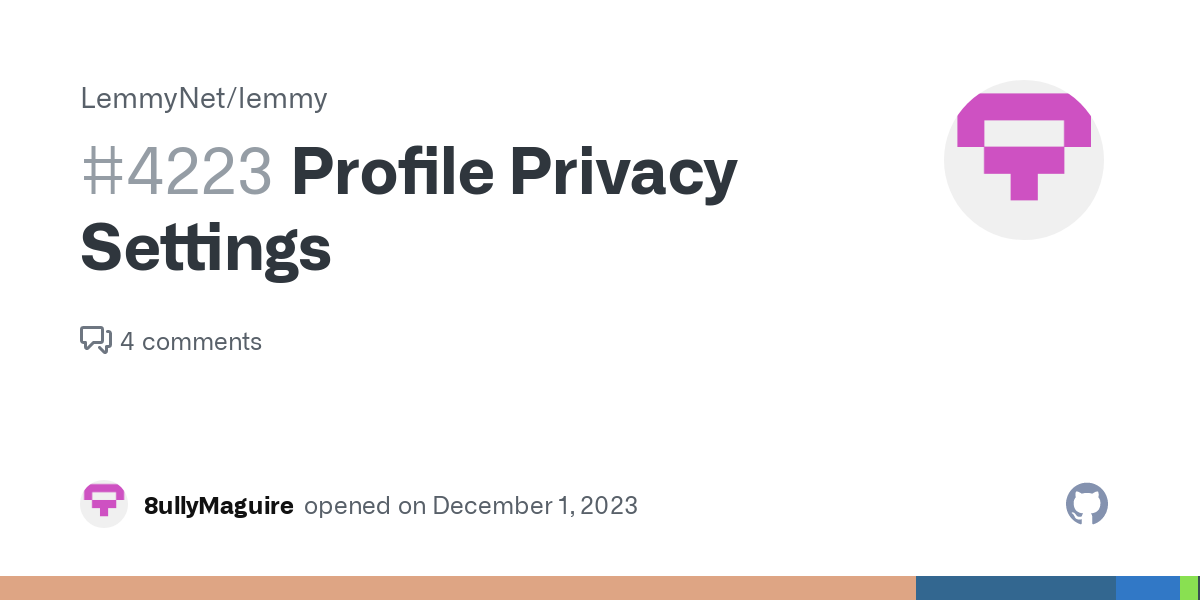Profile Privacy Settings · Issue #4223 · LemmyNet/lemmy
github.comI’ve been grappling with a concern that I believe many of us share: the lack of privacy controls on Lemmy. As it stands, our profiles are public, and all our posts and comments are visible to anyone who cares to look. I don’t even care about privacy all that much, but this level of transparency feels to me akin to sharing my browser history with the world, a discomforting thought to say the least.
While the open nature of Lemmy can foster community and transparency, it also opens the door to potential misuse. Our post history can be scrutinized by creeps or stalkers, our opinions can be nitpicked based on past statements, and we can even become targets for mass downvoting. This lack of privacy control can deter users from actively participating in discussions and sharing their thoughts freely.
Even platforms like Twitter and Facebook, often criticized for their handling of user data, provide some level of access control. Users can choose who sees their timeline: friends/followers, the public or nobody. This flexibility allows users to control their online presence and decide who gets to see their content.
The current state of affairs on Lemmy forces us into a cycle of creating new accounts or deleting old posts to maintain some semblance of privacy. This is not only time-consuming but also detracts from the user experience. It’s high time we address this issue and discuss potential solutions.
One possible solution could be the introduction of profile privacy settings, similar to those found on other social media platforms. This would give users the flexibility to choose their level of privacy and control over their content without having to resort to manual deletion or account purging.
I believe that privacy is a fundamental right, and we should have the ability to control who sees our content. I’m interested in hearing your thoughts on this matter. How do you feel about the current privacy settings on Lemmy? What changes would you like to see? Let’s start a conversation and work towards making Lemmy a platform that respects and upholds our privacy.
A place to discuss privacy and freedom in the digital world.
Privacy has become a very important issue in modern society, with companies and governments constantly abusing their power, more and more people are waking up to the importance of digital privacy.
In this community everyone is welcome to post links and discuss topics related to privacy.
Some Rules
- Posting a link to a website containing tracking isn’t great, if contents of the website are behind a paywall maybe copy them into the post
- Don’t promote proprietary software
- Try to keep things on topic
- If you have a question, please try searching for previous discussions, maybe it has already been answered
- Reposts are fine, but should have at least a couple of weeks in between so that the post can reach a new audience
- Be nice :)
Related communities
much thanks to @gary_host_laptop for the logo design :)
- 0 users online
- 108 users / day
- 435 users / week
- 1.32K users / month
- 4.54K users / 6 months
- 1 subscriber
- 4.65K Posts
- 117K Comments
- Modlog






deleted by creator
In this context, it’s an open public digital space. Noone is obligated share anything.
The part that is discussed as a privacy issue is a design element. It is by design post are visible to everyone, it is by design that comments are visible to everyone.
How is it a privacy issue when the user desides what to post for everyone to see?
If you are looking for a different design ideology then maybe you need a different social media platform.
deleted by creator
I’ve never been on Twitter. Besides Reddit I really disliked all other main platforms. So answering your question: I don’t care, it’s a different platform for different style of social media interactions.
My position has nothing to do with this sentiment. Internet forgets, and often.
I like federated nature of Lemmy, I like that there is no “private” accounts. This is a feature not a bug.
I’m not trying to argue against privacy, but what you are describing isn’t a privacy issue or an issue at all. It’s a design element. And it’s this design is why I like it here.
As someone here has said, at some point the responsibility has to fall on the user. You don’t need to share anything. As long as the nature of the platform is clear (and it’s a separate discussion) the is no issue to be fixed.
If to you that is seems as an issue, well then maybe you are at the wrong place. And if the platform changes in the direction I don’t agree, I will leave.
deleted by creator
How is this conflicting? You are a private person same as I, I don’t know who you are, you don’t know who I am.
How is selective hiding of post and comments privacy?
If you don’t want it to be seen – don’t post it.
deleted by creator
And that is the different premise for the social network.
You do have the equivalent choice here.
If you want Facebook, go to Facebook. It’s not worse or better it’s different.
Well Facebook is worse, but the reasons are corporate not design issues (it’s more complicated than that, but that’s beyond the point).
deleted by creator